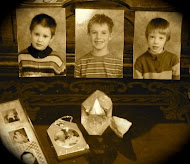Saturday, May 27, 2006
Fame, No Fortune and Fluorescent Orange Pants
CTV National
Click on the link on the right of the print story that says "Video - Rosemary Thompson with the dilemma"
http://www.canada.com/globaltv/national/story.html?id=7cc19aa4-df32-4f85-a3d4-cc2ee714783f Click on the link within the story that says "Mike Drolet Reports"
http://www.pulse24.com/News/Top_Story/20060526-005/page.asp It looks like this one no longer has the video clip available. It's just as well. They did a terrible job with the details.. my name was announced twice incorrectly and they referred to the boys as 5 year old twins. Oh well. At least it made it on air.
Queen's Park Press Conference Speech
I sent an email to Andrew Kavchuk, (www.canadaautism.com) who is the amazing gentleman who protests on Parliament Hill on his lunch hours and coordinates many rallies, press releases, etc. for the autism 'issue', saying thank you for all of his efforts and letting him know that we would be moving to Alberta. He replied immediately with a request that we bring our story to the media in an effort to bring more awareness to what is happening to Ontario families in their plight to get better service for their children who have autism. I seriously debated whether or not I was willing. This is not exactly a time in our lives where we can spare even an hour to devote to something like this. But after talking it over with many people, Jonathan and I both agreed that everything we have worked for in the past year would be for nothing if we couldn't do this one last thing on behalf of the boys. I admit that it is a very rewarding experience to know that we now say that we aren't just moaning and bitching from our couch about the politics of our country, we are actually trying to do something about it.
Julie Lavertue, who works with MPP Shelley Martel, contacted me to ask if we could participate in a press conference that would be held at Queen's Park. We said yes and it then meant that I had to write a speech that was only supposed to be 3 to 5 minutes long. It turned into this: (pardon any grammatical errors, it was written between midnight and 4am)
If you knew my life, you could appreciate how difficult it is for me to be doing something like this. The average day in my household is pure and utter chaos, where every moment is scheduled and there isn’t a second to spare. I have three boys under the age of five and my twin three year old sons both have autism. We are weeks away from a move across country and as you can imagine, there are a million things to do to prepare for it. The decision to tell our story was a pretty simple one however. This is the last gift we can give on behalf of our boys, in the hopes that when it’s decision making time in Ontario, when it comes to deciding on how to handle the ‘autism crisis’ in this province, someone might remember our family’s story and they will make decisions that will not force any other families to have to make the heartbreaking decision that we had to.
If someone had told me a year ago that I would find myself here today, I would have never believed it. Two years ago we were just a regular family of five. We struggled on a single income, my husband is a school teacher and I was unable to return to work from my maternity leave because my twins just weren’t “daycare material”. They were very fussy, they had funny quirks that none of us understood, they weren’t developing the way that their same-age peers were and they weren’t seeming to develop any speech, in fact, their only form of communication was to scream and cry. Neither of the boys were really connecting with anyone, they wouldn’t cuddle or even make eye contact with anyone. We have hundreds of toys and they wanted nothing to do with them. Will could spend hours and hours pulling loose threads out of our couches and Owen would be in his own little world, scrunched up in a ball, trying to squeeze himself into any crevice or small space he could find. They seemed to feel no pain and they had no sense of danger. The only activity that seemed to bring them any joy would be to jump and flap or obsess over opening and closing doors over and over again.
After voicing my concerns to our family doctor, we waited months before getting picked up for assessment at the Grandview Children’s Centre. On June 7th, 2005, Owen was diagnosed with Autism. If you are a parent, you can perhaps understand the anguish we felt at learning that our son would have to struggle with this complex disorder. There really are no words to describe how that news turned our world and our dreams upside down. One week later, we received the same diagnosis for Will.
Upon receiving the diagnosis, we were given a checklist of sorts by our developmental pediatrician. Number one on the list was to contact Kinark to get on the waiting list for IBI. It was explained to us that IBI therapies was critical for our children to have a chance to overcome some of their challenges. We were told that we were ‘lucky’ in some ways because we had received a diagnosis so early, because between the ages of two and six, it is the optimum time for a child to ‘rewire’ the brain so that he may learn how to learn, to socialize, to play, to communicate, etc. We were told that with hope and with therapy, maybe the boys might someday be able to go to school with their peers. We left the assessment feeling devastated, but still hopeful that there were treatments out there that might help.
We immediately started to research all that we could about Autism. It didn’t take a scholar to realize that IBI was what we needed for the boys and we needed it now if they had any chance at ever catching up to their peers. But when I started making the calls to all of the agencies that I was referred to for services, I soon understood that it wouldn’t be so easy. For IBI, we were put on a waiting list for in-take, then a waiting list for assessment to even get the boys ON TO the waiting list for service, and here we sit on the waiting list now. No closer to accessing the services the boys require. I won’t get into the how’s and why’s of funding in Ontario or the breakdown of costs or what determines a child’s ranking on the list. I’ll leave that to people like Bruce MacIntosh, who has put in the hard work to understand the system so he can advocate on behalf of all of us other families who don’t have the energy. All I can tell you is how it has affected my family and how it has FAILED my boys.
People assume that when you get a diagnosis for something by a medical professional, naturally, you will be given a prescription of sorts or instructions on how you will proceed with treatment. In our experience, being a parent of children diagnosed is a very helpless and lonely experience, especially in those early months. Not only are you grieving the loss of a future you thought your children would have, but you are blindly left to figure out on your own, where to turn to access the services to help your children. Last June we understood that even IF our boys would ever get funded IBI, they would only receive it until the age of 6. I have met many parents of children who have autism at the many protests and rallies that I have participated in and I can’t count how many told me that their children never saw the day that IBI was provided to their children, because they were kicked off the list after turning six years old.
It has never been an option to my husband and I that we would just sit around and wait with crossed fingers, for our boys to get picked up. They are beautiful boys with obvious intelligence. It seemed to us that they just needed some help to remove the veil that separated them from connecting with everyone around them. We weren’t going to sit and watch our boys become more and more withdrawn, more and more frustrated and angry because they couldn’t communicate, more and more lost to us. This not only hurt us as parents, but it hurt our older son, Jake, as well. How do you answer a four year old when he asks you why his brothers don’t love him because they won’t let him hug them? He wonders why his brothers don’t talk like other little brothers do and he wonders why his life has to revolve around the needs of two very difficult little boys. Jake’s life will never be an easy one either. For our whole family, we knew that we had to do whatever was within our power to provide Owen and Will with every opportunity to succeed in life. Just as we would with Jake.
Against all instinct, our reaction was to open ourselves up and make our very private pain, very public. We told all of our friends and family what we were up against and we asked for help. The response was tremendous. Our community of Bowmanville, our church, our friends, co-workers and especially our family, rallied behind us. We created the name “Willowjak”, combining the names of all three of our boys. We created something called a “Circle of Support”, bringing together key people who wanted to commit to supporting us long-term. These people became our life preservers. Brainstorming led to fundraisers. We planned an event for nearly every month, from dances, to silent auctions, selling homemade jewelry, holding rummage sales, canvassing, having raffles… The compassion of strangers and friends alike kept us motivated to continue on. Anonymous donors, business owners, the Rotary Club, our church congregation – they all stepped forward and financially and emotionally supported us. We set up a website http://www.willowjak.com/ and we tried to provide some information about autism to inform people of what they were contributing to. Through fundraising, we saw that we were becoming advocates for the autism community. We spent hundreds of dollars on autism awareness items (car magnets, bracelets and t-shirts) and we handed them out, thinking that the more awareness we could raise, the more it would help our efforts. We started attending rallies and protests at Parliament Hill and Queen’s Park. We were very successful for six months and the money that we raised allowed us to put the boys into 20 hours a week of therapy and their enrolment into a nursery school program.
We immediately saw a change in the boys. Over the months that followed and hours and hours of repetitive teaching, the boys acquired simple skills that most people would take for granted. They learned to pull up their own pants, they learned to use our hands to guide us to what they wanted, instead of just screaming in frustration, they started to make eye contact with people if even but for a brief moment. All of this came at a price. The private therapy cost $7000 a month. Add the cost of supplies and therapeutic equipment, then the cost of respite care and it totaled $7500. As suggested by professionals, we really wanted to increase the hours of therapy to 40 a week, but there is no way we could afford a price tag of $15000 a month. The other cost was what it was doing to us.
The toll that fundraising takes on you is harsh. It’s a full-time job. It’s time away from being a “normal” family. It’s hours on the phone. It’s hours of begging and pleading. It starts to wear on your relationships with friends and family. People start to avoid your calls because they only anticipate your request for them to buy a ticket to another event. It’s sometimes humiliating, always humbling and something that no family should have to do. We did it because we had to. And we did it because our boys deserve it. And we did it because no one else would do it for us.
At the end of the day, when my husband and I would sit and try to take stock of where we were and where we were going, there was nothing but panic and fear in our future. Because we knew that fundraising was not sustainable. You can only ask so much of your community. We weren’t looking for a temporary solution either. We were looking at the need for funding for many years to come. No matter what we do for our boys, it would either cost us now in the form of IBI, or it would STILL cost us twenty years from now, in having to support two grown men who could not support themselves. This is not a temporary challenge. It’s one that we will have to face every day of our boys’ lives. It’s enough that we have to deal with the difficulties of our daily life, but it’s an absolute slap in the face to know that the province I love, Ontario, has failed us. Has failed our boys.
I saw a news story in February about a family that moved from Saskatchewan to Alberta, to access superior care and treatment for their autistic son. I booked a flight out to Calgary within the week to investigate it for myself and I knew within my first day out there that it was the ONLY decision that would be right for my family. I met with many families who had also made the move to Alberta from another family and it was unanimous: it might sound too good to be true, but it really was as good as it sounded. There is still obviously an assessment process, but the approach appears to be quite different than in Ontario. In Ontario, they seem to ask “how severe is your child’s disability?” and they determine your level of need based on that assessment. In Alberta, they ask “how does this disability affect your family?” They look at the big picture. And what a breath of fresh air that is. Waiting lists are minimal; a couple of months, maybe a bit more, just to get through the assessments and hiring of staff. IBI funding goes to the age of 18. Some families may even be granted respite funding. Nursery school is paid for with proper aides for special needs children.
It was a no-brainer. It’s not a question of should we go. It’s when do we go. As we all know, Calgary’s housing market is booming and the average selling price of a home is nearly triple the cost of our current one. But again, we’re in debt with no hope in Ontario, we would rather be in mortgage debt but with service in Alberta.
I am not at all pretending that this is not heart-wrenching for us. It is the biggest sacrifice we will ever have to make for our kids. My husband and I have lived in Ontario all of our lives. The community, the friends, the family members, all of our support that we have built around the boys will be left behind. We don’t know anyone in Calgary except for the people that we have met because of this decision. We are leaving grandparents, aunts and uncles, best friends, ill relatives.. all behind. My oldest son Jake has probably had the hardest time understanding why we have to leave. He realizes that he will no longer get his sleepovers at Granny’s or his special dates with his Auntie. He doesn’t understand why he won’t be able to have playdates with his Junior Kindergarten playmates. We know that Jake will adjust. And we know that we might finally be able to live a “normal” life, or at least as normal as it could be when you live with autism. But it will be a life without fundraising. Without fear of not knowing from one year to the next if the funding situation will change.
I "winged" the conclusion. Not sure what I said. I was too busy getting all teary-eyed like an idiot to remember much.
Julie and Shelley were soooo kind. I was very nervous and they both put me at ease. Mom came along to offer her support and she handed out Ellen Notbahm's "Ten Things Every Child With Autism Wishes You Knew" to all of the press. I felt that the press conference went really well, even though I didn't have any others to compare it with. Bruce McIntosh did a wonderful job, as did Shelley and they conferenced in Deborah Campbell, who is a parent who moved out to Alberta last year for the same reasons we will be. I think I made a connection with many of the newspeople and even saw many of them tear up from our story.
Immediately following the conference, we were each individually asked to participate in interviews for CBC, CTV, Global, CITY-TV and CBC Radio (French). After getting through the press conference, I wasn't nervous about doing the interviews but I was more terrified at the thought that Global and CTV wanted to meet me back at the house to do the interview there --- our house was such a mess!!! Fortunately, Diane had the boys at the house and she also ended up getting her 10 seconds of fame on Global's coverage. She was great.
I am proud that we did this. It has definitely given me a sense of closure to know that we have really done the best that we could in the short time that we have lived with this new journey that we are on. I have been feeling so guilty, as if we were 'bailing out' on all of the other families who have children with autism in Ontario, as if we were taking the easy way out. I hope that they see that we are just doing our best and I hope that they see that we have done our best to do something that is bigger than us, to help the other families who, for whatever reason, aren't able to be so public with their own stories. The feedback from the autism community has been tremendous and the stories were aired across the country.
Hopefully Mr. McGuinty took a moment to absorb the pain from the black eye he suffered yesterday. I can guarantee that his pain doesn't even compare to that of the families of Ontario, whose mere existence he seems to be denying...
Tuesday, May 23, 2006
Mom's Day Tea Times 3
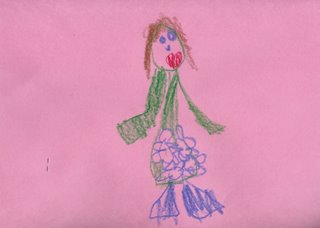
I'm backtracking as usual. But there's no better time than the present to pop in a quick post about stuff that happened two weeks ago - right?
Let's start with the Mother's Day Teas. When I was a kid, I don't remember my school ever having special days where we got to invite our parents into our classroom for special holidays where we got to show off our talents and present them with homemade gifts. Do you? I'm not complaining. This is my year that I got to wear the "Mom of school kids" hat and I have enjoyed every visit into both Owen & Will's nursery school classroom and Jake's kindergarten classroom.
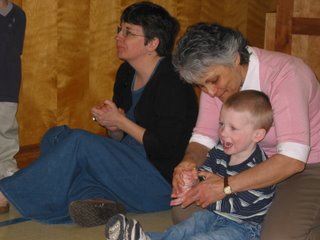 For Mother's Day, the nursery school invited all of the moms in for a tea. The best part for me was watching all of the kids' faces when they realized that their moms had crossed over into their territory. They almost seemed confused that their moms could even exist in their little lives where only other 3 year olds and teachers lived from 9 until 11:30 every morning. Will and Owen were both excited to see me. They were a little upset at first because I think that they thought I was coming to pick them up early and they clearly don't like their routine disturbed. But once they realized they were staying, it was all smiles. I actually got to
For Mother's Day, the nursery school invited all of the moms in for a tea. The best part for me was watching all of the kids' faces when they realized that their moms had crossed over into their territory. They almost seemed confused that their moms could even exist in their little lives where only other 3 year olds and teachers lived from 9 until 11:30 every morning. Will and Owen were both excited to see me. They were a little upset at first because I think that they thought I was coming to pick them up early and they clearly don't like their routine disturbed. But once they realized they were staying, it was all smiles. I actually got to 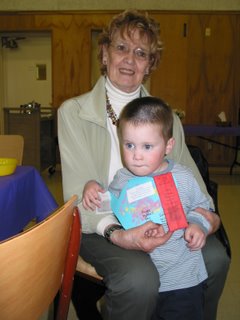 participate in two teas for the "Brothers" because they are the only kids that are in both nursery school groups (Monday/Wednesday & Tuesday/Thursday groups). On the second day, I brought my Grandmother with me. The boys didn't really want much to do with sitting at the table, especially since they refuse to eat anything that was offered. Lucky for us, the teachers brought along the ever-reliable Nutrigrain bars and that kept them happy. A couple of songs were sung by the class; neither of the boys really participated, but the teachers tried to get them involved. The cutest part of the day were the gifts that were distributed to the moms. Each child particpated in the making of it. Here is one of the placemats that I received.. They also made bookmarks that had the kids photos of them. Momentos that I am so afraid I won't manage to keep safely in the years to come, but I'll do my best.
participate in two teas for the "Brothers" because they are the only kids that are in both nursery school groups (Monday/Wednesday & Tuesday/Thursday groups). On the second day, I brought my Grandmother with me. The boys didn't really want much to do with sitting at the table, especially since they refuse to eat anything that was offered. Lucky for us, the teachers brought along the ever-reliable Nutrigrain bars and that kept them happy. A couple of songs were sung by the class; neither of the boys really participated, but the teachers tried to get them involved. The cutest part of the day were the gifts that were distributed to the moms. Each child particpated in the making of it. Here is one of the placemats that I received.. They also made bookmarks that had the kids photos of them. Momentos that I am so afraid I won't manage to keep safely in the years to come, but I'll do my best. 
Jake's class also did a great job of putting on a little show for all of the moms. They sang a total of three songs for us, "Five Green and Speckled Frogs", "I'm a little tea-pot" and "Glub, Glub went the little green frog". Jake seemed to have a bit of stage fright and was so cute to watch. It's so out of character for him to not sing with animation. After their performance, the kids brought us gifts that they
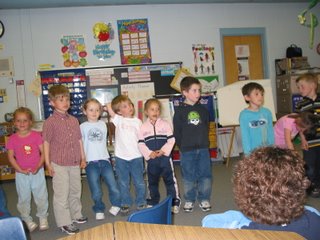
had grown and made themselves: homemade cookies, tea pot cards with a bag of tea and bean plants in decorated pots. You couldn't ask for better gifts for Mother's Day than to know your children made them themselves.
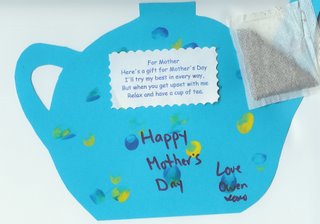
Monday, May 22, 2006
He Loves Me, Mommy!
Jake and Will have always had a brotherly relationship. They play chase, Will seeks Jake out and they giggle and hug together and an observer can see a genuine connection between the two boys. Sadly, Owen has always rejected Jake's attempts at hugs and kisses and has never participated in any games that Jake has initiated with him.
On more than one occasion, Jake has asked me, "why doesn't Owen love me, Mommy?". It breaks my heart. It's tough trying to explain that Owen does love Jake, he just doesn't know how to express himself. How do you tell a four year old that a characteristic of Owen's autism is that he is averse to physical touch from most people, particularly men. In fact, Owen only finally started letting Jonathan hold him in the past couple of months. It's especially difficult because Jake can see that Owen is free with his hugs and cuddles when it comes to the women in his life; me, my sister, his grandmothers, therapists, nursery school teachers, and all of our 'girls'. Jake has said "He hugs you and Gamma. He must not love me".
Now that Owen is signing a little bit, it has opened up an opportunity for Jake to connect with his brother. Today Jake initiated singing Owen's favourite songs and worked with Owen on signing for "more music". Jake was obviously thrilled at how it was going and took it a step further by leading Owen to the middle of the living room and while holding hands, they danced in circles together. This went on for nearly ten minutes. Usually, Owen would throw Jake's hands away and would run off. Today, he not only hung on to Jake, but he looked him straight in the eyes with a huge grin on his face and copied Jake's lead at the dances; jumping when Jake jumped, etc. At one point as things were winding down, Jake stopped dancing and Owen reached up to him and tried to climb into a hug with him. Jake hugged him back and he wore the HUGEST grin on his face. He turned to me and said "Owen really loves me, Mommy!". I cried.
Skinnamarinky-dinky-dink and Jumping Jacks
It's times like this when I feel like a terrible Mom. Owen has reached a huge milestone in his young life and I have forgotten the date it all started. I am looking back at my calendar and I am going to take a stab at it and guess that it happened on Tuesday, May 2nd. Dana & Emily - please jump in with a comment and correct me if I am wrong. I have put off posting this because I was going to work my way back into those missing weeks where I fell behind in posting updates, but I don't know that I'll ever manage to catch up on what we missed, now Owen hit a second target and I can't put it off any longer.
So...

Dana and Emily were over for their regular weekly visits and as per usual, the minute Em walked through the door, Owen lifted Em's arms up to show her that he wanted her to do jumping jacks for him. It's quite comical to watch. Emily exhausts herself with the exercise while Owen jumps up and down on the spot, flapping his hands and grinning from ear to ear. He loves it. Whenever she stops, he moves her hands back in place to start it all over again. This time, I asked Emily to not accomodate Owen until we could get him to request it appropriately. We have been working on teaching the sign to Owen for "more", for months, but it never really seemed to stick. We would have Emily do a couple of jumps, then stop. Owen would prompt her to lift her arms and we would say the word "more?", we would demonstrate the sign for "more", then hand-over-hand place Owen's hands in position to sign it. The second he signed it (with our hands guiding), we would say "good! more!" and Em would immediately start jumping again. Em's jumps were only a few at a time and as this progressed, we would gradually change the method of how to guide Owen. We went from hand-over-hand, to holding his elbows and pressing them towards the motion, to simply tapping his elbows to prompt him to do it himself, to not touching him at all, to no longer giving him the visual prompt or example of our signing the word, to not even saying the word and just sitting and waiting quietly to see if he would do it himself. After about 45 minutes of this (and poor Em getting VERY tired), Dana, Jake, Emily and I waited very patiently, Owen looked around the room and very purposefully signed "more" while we all cheered and clapped. This got him so excited that every time he did the sign, he would turn to glance at all of us to see if we would cheer.
I cannot tell you how proud of him I was. Who would have thought watching your child tap his fingers together would bring me so much joy. But it did. The word "more" has done more than prove to us that Owen is a smart kid who can learn new skills. But it has given him a voice and opened up a door to a whole new world. You can honestly see it in his face that he has a sense of pride because he has found a way to communicate his needs and wants to us. I can tell you that we didn't deny Owen much of anything in the first couple of weeks after he learned that sign. How can you say no to him when he wants more chips, even though you know it's ruining his supper. It's a beautiful thing.
 I have tried to explain to Emily how wonderful it is that she played the most important role in teaching this skill to Owen. If it weren't for her patience, her persistence and her gentle way with Owen, I think it would have taken us a few more months before we would have accomplished this. She should be very proud of herself and she will always be a very important figure in our boys' lives.
I have tried to explain to Emily how wonderful it is that she played the most important role in teaching this skill to Owen. If it weren't for her patience, her persistence and her gentle way with Owen, I think it would have taken us a few more months before we would have accomplished this. She should be very proud of herself and she will always be a very important figure in our boys' lives. So naturally, we obviously want to build on Owen's new skill and teach him some more concrete words. "More" is great,
 but it's very abstract and can be used in the place of any and all nouns. We obviously don't want Owen taking the easy way out and only signing "more" when he should be saying "books", "help", "open",
but it's very abstract and can be used in the place of any and all nouns. We obviously don't want Owen taking the easy way out and only signing "more" when he should be saying "books", "help", "open",  "crackers", "music" or "milk". We are currently working on the sign for "milk" and he isn't quite there where he will voluntarily sign it by himself, we still have to use hand-over-hand. We've also got the sign down for "book", but there hasn't been much motivation for him to request a book when he knows he can find one for himself.
"crackers", "music" or "milk". We are currently working on the sign for "milk" and he isn't quite there where he will voluntarily sign it by himself, we still have to use hand-over-hand. We've also got the sign down for "book", but there hasn't been much motivation for him to request a book when he knows he can find one for himself. Owen loves the mirror. You can often catch him making faces and gestures into the reflection from the television, a mirror or the drain cap in the bathtub. The other day I started paying closer attention to his gestures and realized there was a pattern to his hand motions. When I studied them, I realized that he was doing the gestures to Sharon, Lois and Bram's Skinnamarink song. He would put one hand at the opposite elbow, then the other, then point two index fingers into his cheeks below his eyes as if he was saying "I", cross his arms over himself like a hug... when I said "Skinnamrinky-diny-dink" he jumped up and down as if to say "You get it! I want you to sing it!". He put my own arms and hands into position to prompt me to start singing. Diane sings this song with Owen, over and over again, so I knew that it was a favourite of his. I was thrilled and also felt a pang of guilt that Owen has probably be trying to communicate this to me before and I had never noticed.
Last Thursday Auntie Boom came over for a visit. We sang a few songs for the kids (I'll spare you the agony of hearing an audio clip) and Owen kept signing "more". I mentioned to Steph that I've been working on the sign for music (click on the highlighted word and it will take you to a site to show you how to sign the word yourself) so we set out to follow the same method that Emily and I had used for "more". Skinnamarink was the song of choice and I'm sure that we worked on it for an hour, but never really got past doing the sign hand-over-hand with Owen. He was pretty ticked off with us that we were making him work for something that he was used to getting for free. We finally gave up, but we were proud because he had signed "music" at least twice on his own so we knew he could do it. No new attempts were made in the following days, but I was sitting on the couch yesterday and Owen ran over to me and made the sign out of nowhere! I was so excited. I sang his favourite songs to him (at least someone loves my voice) and he went on for an hour requesting "more music". Owen's version of the sign is a lot simpler than the ASL version. He simply rubs his right hand over his left arm, but we know what he's saying..

It's been quite a month for Owen and it's just the beginning. It's important to know that we are not only spending the time on Owen to learn how to communicate. Efforts have been made with Will, but he doesn't have the patience to sit with us through trial after trial and usually gets mad when we try to hold his hands into place. Will is babbling like crazy and we suspect that he may never sign and just move straight into speaking real words, while Owen might sign first and maybe entertain the thought of talking.
For anyone who would like to learn some signs, there is a pretty cool website that shows you a video clip of someone signing individually selected words that you can search through. Check out http://commtechlab.msu.edu/sites/aslweb/browser.htm
N.B. Stephanie is personally responsible for Owen learning "music"
Raising Boys
... and yes! we can relate.
The following came from an anonymous mother in Austin, Texas: Things I've learned from my children (honest & no kidding):
1. A king size waterbed holds enough water to fill a 2000 sq. ft. house 4 inches deep.
2. If you spray hair spray on dust bunnies and run over them with roller blades, they can ignite.
3. A 3-year old's voice is louder than 200 adults in a crowded restaurant.
4. If you hook a dog leash over a ceiling fan, the motor is not strong enough to rotate a 42 pound boy wearing Batman underwear and a Superman cape. It is strong enough, however, if tied to a paint can, to spread paint on all four walls of a 20x20 ft. room.
5. You should not throw baseballs up when the ceiling fan is on. When using a ceiling fan as a bat, you have to throw the ball up a few times before you get a hit. A ceiling fan can hit a baseball a long way.
6. The glass in windows (even double-pane) doesn't stop a baseball hit by a ceiling fan.
7. When you hear the toilet flush and the words "uh oh," it's already too late.
8. Brake fluid mixed with Clorox makes smoke, and lots of it.
9. A six-year old can start a fire with a flint rock even though a 36-year old man says they can only do it in the movies.
10. Certain Lego's will pass through the digestive tract of a 4-year old.
11. Play dough and microwave should not be used in the same sentence.
12. Super glue is forever.
13. No matter how much Jell-O you put in a swimming pool you still can't walk on water.
14. Pool filters do not like Jell-O.
15. VCR's do not eject PB&J sandwiches even though TV commercials show they do.
16. Garbage bags do not make good parachutes.
17. Marbles in gas tanks make lots of noise when driving.
18. You probably do not want to know what that odor is.
19. Always look in the oven before you turn it on. Plastic toys do not like ovens.
20. The fire department in Austin, TX has a 5-minute response time.
21. The spin cycle on the washing machine does not make earthworms dizzy.
22. It will, however, make cats dizzy.
23. Cats throw up twice their body weight when dizzy.
24. The mind of a 6-year old is wonderful. First grade...true story: The day the first grade teacher was reading the story of the Three Little Pigs to her class. She came to the part of the story where the first pig was trying to accumulate the building materials for his home. She read, "...And so the pig went up to the man with the wheelbarrow full of straw and said, 'Pardon me sir, but may I have some of that straw to build my house?'" The teacher paused then asked the class, "And what do you think that man said?" One little boy raised his hand and said, "I think he said...'Holy sh*t! A talking pig!'" The teacher was unable to teach for the next 10 minutes.
25. 60% of men who read this will try mixing the Clorox and brake fluid.
Friday, May 19, 2006
Holland
A woman named Emily Perl Kingsley wrote an essay that has greatly helped me to keep things in perspective when I feel overwhelmed with sadness for the loss of the future I thought we would have with our boys. I believe that she is the mother of a child who has Down's Syndrome.
Source
Welcome To Holland
byEmily Perl Kingsley
c1987 by Emily Perl Kingsley. All rights reserved
I am often asked to describe the experience of raising a child with a disability - to try to help people who have not shared that unique experience to understand it, to imagine how it would feel. It's like this......
When you're going to have a baby, it's like planning a fabulous vacation trip - to Italy. You buy a bunch of guide books and make your wonderful plans. The Coliseum. The Michelangelo David. The gondolas in Venice. You may learn some handy phrases in Italian. It's all very exciting.
After months of eager anticipation, the day finally arrives. You pack your bags and off you go. Several hours later, the plane lands. The stewardess comes in and says, "Welcome to Holland."
"Holland?!?" you say. "What do you mean Holland?? I signed up for Italy! I'm supposed to be in Italy. All my life I've dreamed of going to Italy."
But there's been a change in the flight plan. They've landed in Holland and there you must stay.
The important thing is that they haven't taken you to a horrible, disgusting, filthy place, full of pestilence, famine and disease. It's just a different place.
So you must go out and buy new guide books. And you must learn a whole new language. And you will meet a whole new group of people you would never have met.
It's just a different place. It's slower-paced than Italy, less flashy than Italy. But after you've been there for a while and you catch your breath, you look around.... and you begin to notice that Holland has windmills....and Holland has tulips. Holland even has Rembrandts.
But everyone you know is busy coming and going from Italy... and they're all bragging about what a wonderful time they had there. And for the rest of your life, you will say "Yes, that's where I was supposed to go. That's what I had planned."
And the pain of that will never, ever, ever, ever go away... because the loss of that dream is a very very significant loss.
But... if you spend your life mourning the fact that you didn't get to Italy, you may never be free to enjoy the very special, the very lovely things ... about Holland.
Thursday, May 18, 2006
The Day Life Changed, a New Chapter & Gratitude
Last May I knew in my gut that something wasn't 'right' with Owen. In fact, I think I knew something wasn't right when he was 11 months old. There wasn't the typical gesturing and mimicking that typical children would engage in. He was absolutely indifferent to his surroundings much of the time and had ZERO connection or acknowledgement of his twin. He could spend hours just staring at his twirling, fidgeting fingers. He would push me away at my every opportunity to hug him or cuddle. Grandparents, other family members and friends would come through the front door with a "hey there Owen" and he wouldn't even give them a glance to acknowledge that they were there. I think back to Owen and Will's first birthday party and there was NO interest in the wrapping paper or gift boxes. Not even a second was spent with a new toy. The cupcakes with their inviting chocolate icing was barely even tolerated and I remember thinking back to Jake's 1st birthday party and how alert and involved he was compared to Owen. Hindsight is 20/20 and looking back, I could recite a list as long as my arm of all the things that made me suspicious.
June 7th, 2005 was a day we will never forget. Jonathan and I brought Owen to the Children's Centre, where he was first assessed by an audiologist. I remember sitting in the little booth with Owen on my lap and the technician was flicking the buttons that would trigger different sounds to burst from Owen's left, then his right. When he wouldn't respond to the sounds that I myself could hear, I remember thinking "okay, this is good. He's just deaf! We can deal with a hearing impairment." Then the tech asked me to direct Owen's attention to the little bird decal that was pasted on the wall straight ahead in our line of vision. She wanted to be sure that Owen did not have his head turned in favour of one side over the other. No matter what I did; I pointed to the sticker, I tried to verbally instruct him to look, I physically turned his head to direct his gaze to that little bird and I remember thinking, "Why doesn't he understand what I'm asking of him. He's two years old and he doesn't get it". I knew he wasn't deaf. The technician confirmed it.
Next we went into another little room with the speech therapist. She just wanted to try to play with Ow and see how he communicated. He did not even acknowledge her. She took out the bubbles and Owen just let them pop off his nose. No attempts at popping them with his finger or between clapping hands. When she placed the wand in his hand, he just let it fall. He ended up laying on the floor and bawling, with his hands over his ears.
Next we sat with the developmental pediatrician. When her office door closed behind us as we entered the room, we automatically positioned our chairs to block the exit. We knew we were in for a bumpy ride because Owen couldn't handle being closed up in that little room. Two year olds typically tantrum, but Owen could be relentless when trying to escape a door he doesn't want to be shut behind. The doctor produced a mass of toys to occupy him while we answered her questions. It was quickly apparent that Owen had no interest in toys. He pushed them to the side like they were brussel sprouts. Nothing would appease him. I think we finally gave him a bottle of milk and he laid on his back with his feet in the air while he guzzled it back. This is what he still does.
The doctor proceeded to ask us her questions: does he have any words? -not anymore. how does he communicate his needs? -he doesn't. does he mimic you when you're doing things about the house? -no. what toys does he play with? -none. what foods does he like? -he is missing entire food groups. does he do things to please you? does he give hugs and kisses? -no. does he respond to his name? -no. if you asked him to pick something up from the floor, would he do it? -no. I started to feel the panic rising as I realized that none of our answers sounded good. She asked us to list anything that we thought might be of concern: he licks bricks. he jumps up and down while flapping his hands all the time. all he does is cry. he curls himself into a little ball and squishes himself in tight places. he climbs the furniture. he used to eat lots of foods, now he only eats about 5 things. he's obsessed with his hands. he likes to line things up.
"Based on my observations of Owen today and what you both have told me, I think that I can say with certainty, that Owen has Autism. Here's a checklist of what you need to do. Call this number and get him on the waiting list for IBI. Call this number and get him on the waiting list for speech therapy. Fill out these forms to register Owen as a disabled person for income tax. When he's three, you might get a diaper grant from Easter Seals. I would strongly suggest you register him for a nursery school programme to get him socialized."
Shock. I stayed calm. I remember feeling like I was out of my body. Part of me felt relief. Finally, someone believes me that something isn't right. I wasn't a paranoid, over-reacting mom for pointing out all that he can't do. I'm not a failure just because I can't get my kid to eat carrots or fruit juice, there's a reason for it. My other part felt like I was drowning. It wasn't really happening. She could be wrong. We'll get a second opinion. I looked at Jonathan and couldn't read him. I looked at Owen and I felt heartsick. I knew she was right. I think I always knew. I heard Jonathan ask her more questions but I can't remember what they were. I remember being led down a hallway to meet again with the speech therapist. I thought I was going to collapse. I think I did. I couldn't control my sobbing and I was embarrassed at my outburst. The rest of the day was a blur. Everytime I looked at Owen, I cried.
The week that followed was agony. My emotions were uncontrollable and I suffered through moments of clarity then crashed to absolute despair. I felt so sorry for Owen and imagined every worst case scenario for him. He would never have friends. He would never get married. He would be bullied. He would never let us love him. He may never speak. He would feel alone. Would he someday end up in an institution or group home? I can't speak for Jonathan's experience of accepting the news, but I think it was harder for him. I, at least, had believed something was wrong. For me, the diagnosis was a confirmation of my worst fear and I resented that I was right on this one. Jonathan and I rationalized the diagnosis by saying, "okay. I can see it. This is why Owen does these weird things that Will doesn't. Owen always has been a pickier eater than Will. Owen is more withdrawn than Will. Owen flaps and Will doesn't". At the time, I guess I chose to ignore the fact that Will ate rocks. That he had obsessive behaviours. That he picked every loose thread out of our couch until it had to be thrown out. That he had no words. That he walked around with his hands covering his ears all the time. That he wouldn't let me hold him. That he didn't know how to play with toys.
Having twins meant that we could use Will as a baseline of "normal" to explain Owen's autistic "quirks". That is why, when we head back to the Children's Centre on June 14th - one week later - we were not prepared for the devastating news.
"I am convinced that Will has autism".
It is almost too painful to go back in my head to the weeks that followed. All I can say is that somehow we made it through. Once the realization set in, we went into pure adrenaline mode. I needed to read everything I could on the subject. I made all the necessary phone calls and booked all the necessary appointments for in-take and assessments with various agencies. During that time, our families, our girls- Bronwyn and Emma, and Jenny and Ian were who got us through the emotional pain of it all and we are grateful for them. Once we had a grasp of what we needed to do to move forward, Jonathan did something that I never expected. He wrote an email to everyone we knew. He told everyone about the diagnosis that we had received and he made a plea for anyone who had any resources or contacts to please pass them to us. That action of exposing our personal pain to everyone, is what helped us the most. A huge lesson was learned. When you allow yourself to be vulnerable and you ask for help, the world helps you out.
From our church, our fairy godmother, Beth, stepped forward and opened up possibilities for us that we didn't know existed. We enrolled the boys in a nursery school with Beth's help, which was housed in our own church. Jonathan attended his annual high-school rugby alumni game and his former coaches, Red, Jake and Rod, made a collection for the boys. It blew us away that people could be so generous and it provided us with the suggestion that fundraising might be an option to access the services that the boys needed.
We soon learned that once you receive a diagnosis for Autism, there are no doctors to set you up with follow-up appointments to tell you where to go next. There's a sense of urgency, a time-bomb is ticking away because the experts tell you that there is hope for your child if you can intervene with therapies during the critical time period between ages 2 to 6. Our developmental pediatrician offered that if we found them some help, maybe the boys could eventually be integrated into a classroom setting with their same-aged peers. The urgency is there, but the services are not. Every phone call that I made, and I can say that I made hundreds in those first few months, reinforced the reality that no treatment would be available for the boys. We would have to wait. Talking with other parents going through the same thing, we learned that some had been waiting for YEARS for service, only to reach the age of 6 and be kicked off the waiting list because that was the cut-off in Ontario.
 We were approached by our friends, Ian & Jenny, Andrew & Patty and learned that they had started plans to hold a fundraiser for our family to happen in September at the Farm. It would be a Pig Roast & BBQ. Maybe it would raise a thousand or two to help fund some of the therapy costs. Never in our wildest dreams could we imagine that hundreds of people would show up and we would raise over $15,000!! We were able to commit the boys to a therapy programme that would take us into the Christmas holidays. The "Willowjak" name was formed and several fundraising efforts followed. Dances, rummage sales, Emily's Beading Buddies, an Autism Awareness event at the Farm, collections at our church. Virtual strangers called us up with donations and offers to put together their own fundraiser for the boys. It was overwhelming and it has forever reinforced our opinion that humanity and kindess do exist and that small-town communities are full of good-hearted people.
We were approached by our friends, Ian & Jenny, Andrew & Patty and learned that they had started plans to hold a fundraiser for our family to happen in September at the Farm. It would be a Pig Roast & BBQ. Maybe it would raise a thousand or two to help fund some of the therapy costs. Never in our wildest dreams could we imagine that hundreds of people would show up and we would raise over $15,000!! We were able to commit the boys to a therapy programme that would take us into the Christmas holidays. The "Willowjak" name was formed and several fundraising efforts followed. Dances, rummage sales, Emily's Beading Buddies, an Autism Awareness event at the Farm, collections at our church. Virtual strangers called us up with donations and offers to put together their own fundraiser for the boys. It was overwhelming and it has forever reinforced our opinion that humanity and kindess do exist and that small-town communities are full of good-hearted people. In January, we switched therapy agencies for the boys. We now had a bill that loomed at the beginning of every month that was over $7000 for 20 hours of therapy a week. This did not include what we paid for respite care in the form of Diane, who had become the heart of our "team" that would help bring Owen and Will out of their shells and into a world of learning, socializing and communicating. It was worth every penny. The change in both of the boys was astounding. Owen has come alive and participates in play and sing-songs. Will has learned how to play with toys appropriately and shows an interest in interacting with his peers and Jake. Both boys have acquired so many skills in their therapy and can put together a puzzle, hang up their own jackets, respond to their names and some verbal requests.
Now that we knew that what we were doing was working, we were realizing that we couldn't afford to keep it up. Looking into the future, how could we afford to maintain this way of life? At home, we were bursting at the seams in our tiny house. We lived in chaos and the twins' shared bedroom situation was becoming a nightmare. Our ongoing efforts to organize fundraising events was killing us and putting a strain on our relationships with friends and family. We wanted to increase the hours of therapy to 40 a week for each of the boys, as suggested, but how could we do that at a price of $160,000 a year, then with respite on top of it! How is it possible?? How could we even put any other money aside for Jake's future? How could we have any semblance of a normal family life if every second was devoted to autism, to fundraising, to therapy..
I can't express how helpless it makes you feel as a parent to know that can't provide for your children. We are the rabbits and there is a dangling carrot hanging in front of our faces in the form of a therapy that we know is working to improve the life of our boys, but we can't reach it. We get little nibbles on the carrot, but it doesn't satisfy the appetite because we know the carrot has to continue to feed us for the next decade or so. We know that we have done the best that we can in Ontario. We have fought. We have begged for help. We have exhausted our resources. We have advocated at Queen's Park and Parliament Hill. We have put our story out in the media and spent money on purchasing Autism Awareness items that we have handed out for free, just to spread the word in the hopes of garnering some interest in the issue. We have done all we can and it's not enough.
It could have been so easy to despair and give up. Just to accept the life that was dealt to us. We could learn to cope. We could learn to accept the fact that the boys might never get to go to a normal school or have a normal job or a normal opportunity at a normal life. But I think that God chose Jonathan and I to be Will, Owen and Jake's parents because He knew that we would do everything in our power to provide them with every opportunity to live to their fullest potential. It has come in the form of a province that sits on the other side of the country. One where I only knew ONE family. A three day's drive from the home that we have lived in our whole lives. Away from the family and friends who have supported us and formed a community that we could safely raise our boys in, with the knowledge that they are loved and watched over by more than just their parents.
We are Alberta-bound and we are excited to start this new chapter in our life. We know we'll be okay. We believe that the boys' needs will be provided for. We will form new friendships and we will keep ties with the friends and family we leave behind. We will be happy. Most importantly, we will do our best to show our thanks to everyone who has ever supported us, by living a full life and never taking one day of it for granted. We will celebrate each one of our boys' achievements. Be it Jake's new drawings or the words he has learned to spell, or Owen's new signing of the word "music", or Will's learning to sit in a chair when watching tv without tantruming. We will continue to advocate for the families who are left behind in Ontario. Those who do not have the means, the where-with-all to pick up and move so far away. Those who do not have the strength to fight or the funds to provide their children with therapy. We will work to promote autism awareness and inclusion in our schools, our churches and our communities. We will show our thanks by just enjoying being a family. By walking each night after dinner and enjoying each other's company. We will form a new life in Calgary and our door will always be open to everyone who has ever entered our lives in Ontario.
I started writing this post to simply relay our happiness in finding a new home. But it's more than just a house. It's a symbol of how far we have come in a year and it represents the hope we have for our future. We are about to start a new life and we will miss everyone who has been a part of the life we had until now. From every one of us and from the bottom of our hearts, thank you.
Tuesday, May 16, 2006
"Five makes me feel very interesting"
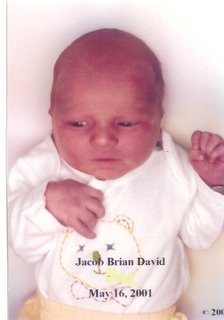
Five years ago today, we were introduced to a little boy with a great set of lungs, long spindly arms and legs and whose presence brought most of us to tears. As I laid in my hospital bed and the doctor yelled "It's a boy!" I heard a cheer arise through the curtain that separated us from our family who had gathered to wait for the news. I will never forget the look on my husband's, parents', sister's and in-laws' faces as they held Jake for the first time. I was already used to him, we had been friends for more than 9 months already. But for those who hadn't met him yet, holding him in their arms for the first time brought each of them to tears and put smiles on their faces that have never disappeared in every meeting with Jake since.
Our boys have been a blessing to our families. They are a gift. As each day passes and we go through all of the challenges of raising kids, it's easy to get caught up in the rythm of just getting by. It's sometimes hard to remember that we need to slow down, to absorb every minute as they grow from little babies, to little boys, to little men.
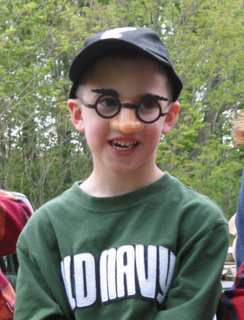
Sometimes I'll be in the room with Jake as he creates a story with his puppets, stuffed animals and little friends. I'll hear his voice and it is white noise; almost an irritant as we're trying to get on with what we're doing. But when I stop to listen, I really hear him. Jake has an imagination that surpasses any child's I have ever met. He has an intelligence that surprises me and fills me with pride every single day. He has an intuitive sense that allows him to be compassionate and understanding. And he has a heart, a smile and a hug that melts my heart.
Jacob is five today. As I woke him up to get him ready for school this morning, he said to me "Mommy. I feel very interesting. You know when I try to explain to you that I feel interesting? But I don't know why I feel interesting. I'm five today, but it doesn't feel different, but it does. Five makes me feel very interesting."
Monday, May 15, 2006
Moms and $350G
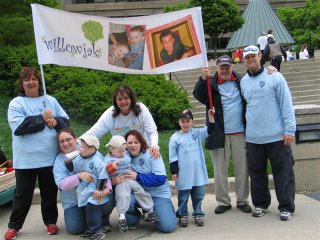 I have so much to catch everyone up on and will do my best in the coming days to fill in some gaps of the past two weeks. For now, I will simply give a quick update on how we spent Mother's Day.
I have so much to catch everyone up on and will do my best in the coming days to fill in some gaps of the past two weeks. For now, I will simply give a quick update on how we spent Mother's Day.I woke up to a "Happy Mother's Day, Mommy!" from Jake as he presented me with probably my 6th homemade mother's day card. I'll have to remember to scan one of them. He is so clever. He found another card that had the correct spelling on it and he copied the words out. Grandad Brian had spent the night and we all got ready for the big day ahead.
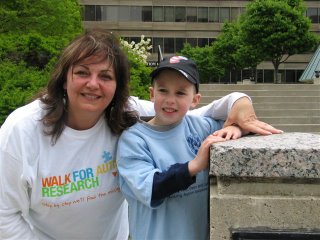
We arrived at Mel Lastman's Sq around 9am and the rain somehow managed to hold off. The Autism Speaks/NAAR Walk for Autism was a great success. It's hard to put into words what made it so special, but it was probably the joy in knowing we were contributing to something that was bigger than us. So many people have supported our family to assist the boys, but we were finally able to give something back to the greater cause. There were over 2500 people out for the walk and everyone was smiling. Knowing that so many of the people who were there had probably spent weeks collecting donations, it makes me appreciate families who are living with autism even more. Because any of us who live in Ontario know that the funding is not ideal, if it's provided at all and I'm sure that many of those who collected would have loved to have collected those dollars to directly help their kids. I personally feel very proud that our Willowjak Team raised as much as it did to help fund Autism research because it makes me feel like Owen, Will and Jake are making a real contribution to ensure that no other families who come after us, have to deal with the same struggles that we do.
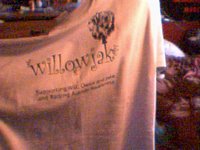
Our team consisted of Grandad Brian, Grandma Wendy, my dear friend Lauren, our girls- Emma and Bronwyn, Diane - our "can't live without", the biggest cheerleader who's ever lived- Auntie Shelley and Michelle and the five of us. We all wore our new Willowjak t-shirts and Mom had a 6ft banner made up with the boys' logo and pictures. We made the Sunday evening news and Jake was seen waving to the camera. I am proud to report that as a team we raised over $1500.00!!! Jake was personally responsible for raising $142.00 after walking door-to-door with Diane earlier in the week. He is very proud of himself, as he should be.
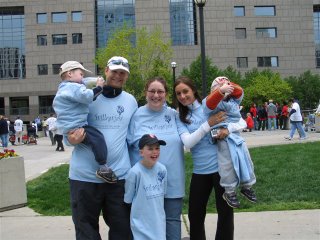 The walk was an easy one and it passed by very quickly with Lauren and I gabbing all the way. A point of interest is that Lauren currently appears in the two new East Side Mario commercials that are out right now. I have heard them, but never paid enough attention to see her, so I'll be watching for her now. We saw a lot of faces that we had met at previous rallies and such and also spent a few minutes chatting with MP Shelley Martel. The boys did so well and I was so happy that they lasted through the whole walk, content in their wagon. As soon as I have some photos, I will include them later in this entry.
The walk was an easy one and it passed by very quickly with Lauren and I gabbing all the way. A point of interest is that Lauren currently appears in the two new East Side Mario commercials that are out right now. I have heard them, but never paid enough attention to see her, so I'll be watching for her now. We saw a lot of faces that we had met at previous rallies and such and also spent a few minutes chatting with MP Shelley Martel. The boys did so well and I was so happy that they lasted through the whole walk, content in their wagon. As soon as I have some photos, I will include them later in this entry. 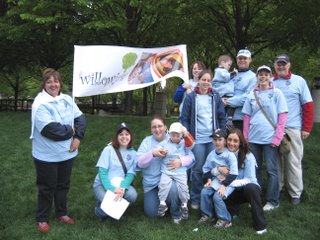
All in all, it was a great Mother's Day. It was definitely a day to reflect on how my vision of being a mom has changed since the last Mother's Day passed in 2005. What a year it has been. But I am so proud of my sons and each day they bring me new joy. I really wouldn't have them any other way.
------------------------
Walk raises $350Gs for autism research
By NICK KYONKA, TORONTO SUN Source
Yesterday may have been Mother's Day, but it was all about the kids at the Toronto Walk for Autism Research.
About 2,500 people took part in the morning stroll around Mel Lastman Square, helping to raise an estimated $350,000 for autism research and awareness campaigns.
"I think we did really well today," said Jyoti Sanwalka, one of the organizers of the walk. "We had a lot of people out, but the nice thing is, they weren't all just parents. We had a lot of support from the community at large."
Affecting about one in every 166 children, autism limits a person's ability to communicate and build social relationships with others.
Yesterday's event was organized by the Canadian branch of non-profit organization Autism Speaks.
The group also helps to educate people about autism, helping parents spot the signs while it is still in the early stages of development.
"A lot of the issue is learning the early warning signs of what autism is," said Suzanne Lanthier, regional director for Autism Speaks and the mother of a 6-year-old autistic son, Scotty.
"The younger kids get diagnosed, the younger they can get treatments and the better off they'll be in the long run."
As for her son, Lanthier credits his early diagnosis with helping him to slowly develop his communication skills.
"There's a lot of families who have children that will never speak," Lanthier said. "I feel lucky that he can ask me for things, tell me he loves me and say hello to me.
"There's families that will never get that."
Autism Every Day
Please take a few moments to watch it for yourself:
http://www.autismspeaks.org/sponsoredevents/autism_every_day.php
Sunday, May 14, 2006
Politics of the Personal - National Post
An MP with an autistic son takes a surprising stand on the issue
John Ivison
National Post Source
Saturday, May 13, 2006
OTTAWA - Mike Lake, a rookie Conservative MP from Edmonton, didn't run for
office to be an advocate for autism but as the father of an autistic son, he
quickly found himself singled out as a potential ally by supporters of
increased government funding.
"When people started calling, how could you possibly reject the opportunity
to do something for parents going through the same thing we went through --
all the same fears and concerns? You can't reject that."
Yet, despite his sympathy for parents, he has refused to back a private
member's bill by NDP MP Peter Stoffer, which proposes that the Canada Health
Act be amended to include autism funding under medicare.
"I'm thankful he's brought it up. But I think it would be hypocritical of me
to say the country needs a more well thought out plan and then support a
bill that would, ad hoc, name autism as the only thing named in the Canada
Health Act. I'm not sure that's the way to go."
Mr. Stoffer's bill is unlikely to reach a vote soon, but he has met with
Health Minister Tony Clement and urged him to sit down with the provinces to
hammer out a financial deal under which Ottawa would pick up the tab for the
intensive therapy funding, which Mr. Stoffer estimates is around
$300-500-million a year. At the moment, the Alberta government pays for all
autism treatment but most other provinces have only patchwork funding.
A spokesman for Mr. Clement said the Health Minister is prepared to sit down
with the provinces.
In his maiden speech in the House, Mr. Lake said responsibility for
providing treatment programs lies with the provinces and territories. But he
added that he would do everything he could to promote action by the federal
government in its areas of authority.
"Had I come in here as an autism advocate and been elected saying I was
going to change the laws on autism, I'd probably have better answers. I
don't have all the answers right now. But I will tell you that there is a
lot of recognition from my Conservative caucus colleagues who recognize the
needs of these families and who have a lot of desire to learn from me," he
said in an interview.
Autism funding has become a hot issue on Parliament Hill since the Supreme
Court ruled in late 2004 that provinces were not infringing the Charter
rights of autistic children by denying them funding for applied behavioural
analysis therapy. The court referred the issue back to Parliament, which it
said should resolve the question of what the public health system should
provide.
Since the provinces have resisted paying for autism therapy, and the courts
have now passed on taking action, there is a growing feeling among some
federal politicians that it is up to them to push for a solution,
particularly as the incidence of autism appears to be on the rise (a recent
U.S. estimate claimed that one in 175 children is now affected).
Politicians of all stripes have supported the idea that funding for
intensive therapy is a sensible investment, without which many autistic
children are institutionalized at public expense.
The Liberal government insisted funding was a provincial issue and refused
to amend the Canada Health Act. But pressure is building on the Conservative
government, even from within its own caucus, to be more responsive. Besides
Mr. Lake, Saskatchewan MP Maurice Vellacott has a 12-year-old son who was
diagnosed last fall with asperger's syndrome, a high-functioning form of
autism.
Mr. Lake has relayed to his colleagues the anxiety parents go through when
their child is diagnosed. He was told his son, Jaden, had the disorder,
which causes verbal, social and emotional problems, eight years ago when the
boy was just two.
"We could tell he was a smart kid, in terms of numbers and the way he played
with letter toys. But he would sit in a corner and play and you could not
get his attention at all. We wondered if he was deaf, but if you went into a
different room and put Winnie the Pooh on television, he'd hear it. Then we
read a book about autism ... and as we were reading this book, we knew. It
was Jaden."
The book talked about the importance of getting children into costly
intensive therapy to help with social interaction.
Mr. Lake was earning a good living as director of ticket sales for the
Edmonton Oilers but was faced with a $40-50,000 annual bill for the
intensive one-on-one treatment. He took out a line of credit but one of the
Oiler players -- he prefers not to say which one -- heard of the situation
and wrote a cheque to cover the treatment. Fortunately for Mr. Lake and his,
wife Debi, the province of Alberta decided to fully fund autism therapy
through to age 18 in 1998, and he never did cash the player's cheque.
Jaden still doesn't talk but Mr. Lake said the intensive therapy -- known as
ABA -- has changed his son's life. "The program works. ABA works," he said.
"Jaden is now in a regular Grade 4 classroom and he might have wound up
being institutionalized in the past."
The treatment is taught through repetition. "The first thing they did was
sit Jaden at a table and put a spoon in front of him and ask him to hand
them the spoon. They would do that six hours a day, for days and weeks. The
next stage, they would put a spoon and a fork down and go through the whole
process again. It is very tedious and intensive. But his pediatrician said
that he is entirely different due to ABA. He's now one of the most amazing
kids -- he will look you in the eye and he will understand you when you ask
him to do something."
Unfortunately, Alberta's generous funding is the exception. Ontario and
British Columbia both fund treatment until age six -- if parents can access
the limited number of spaces. "I know of several families who are moving to
Alberta to get the funding," Mr. Lake said. "That's not the way the system
is supposed to work."
jivison@nationalpost.com
© National Post 2006
World-renowned autism expert joins Capital Health and the University
World-renowned autism expert joins Capital Health and the University
of Alberta Source
May 12, 2006
Dr. Lonnie Zwaigenbaum will join the Stollery Children's Hospital
Edmonton, Canada – Capital Health has recruited one of the world's
leading experts in autism. Dr. Lonnie Zwaigenbaum will join the
Stollery Children's Hospital and the University of Alberta in August.
He is currently at McMaster Children's Hospital and McMaster
University in Hamilton. Dr. Zwaigenbaum will see patients and families
at his new centre to be located at the Glenrose Rehabilitation Hospital.
"Capital Health is committed to exploring and applying new treatment
methods for autism, the most common neurological disorder among
Canadian children," says Dr. Terry Klassen, Chair of the University of
Alberta's Department of Pediatrics and Regional Clinical Program
Director of Capital Health's Child Health Program. "Dr. Zwaigenbaum's
cutting-edge research will continue to improve the lives of thousands
of children and families and add to the Stollery's role as a leader in
complex care and a resource for all Canadians."
Dr. Zwaigenbaum is known internationally as the author of a 2005
breakthrough study that made him the first to pinpoint specific
behavioural signs in infants as young as 12 months that can predict,
with remarkable accuracy, whether a child will develop autism.
His work with Capital Health's Stollery Children's Hospital as
Director of the Center for Excellence in Autism Research and as
Associate Professor of Pediatrics at the University of Alberta will
include studying the unique differences in early brain development in
these infants who are subsequently diagnosed with autism. His research
program will help to understand the origins of autism.
"Our clinical team is currently treating almost 800 autism patients
from across Western Canada," says Deb Gordon, Vice President and Chief
Operating Officer for the University of Alberta Hospital and Stollery
Children's Hospital. "The addition of Dr. Zwaigenbaum allows Capital
Health to enhance its strong clinical team at the Autism Spectrum
Disorder Follow-up Clinic at the Glenrose Rehabilitation Hospital."
Autism Spectrum Disorder is estimated to affect approximately 190,000
Canadians.
About Capital Health
Capital Health in Edmonton is Canada's largest health region and is
affiliated with the University of Alberta, providing integrated health
services to one million residents in Edmonton and the surrounding
area. Capital Health acts as a referral centre to central and northern
Alberta, the North and the Prairies, providing specialized services
such as trauma and burn treatment, organ transplants and high-risk
obstetrics.
About The University of Alberta
The University of Alberta in Edmonton is one of Canada's premier
teaching and research universities serving more than 36,500 students
with some 9,000 faculty and staff. It is internationally recognized
for its diabetes treatment breakthrough, advanced nanotechnology
research, innovative technology transfer, environmental studies and
English literature.
Senator wants inquiry on autism strategy
-----------
Funding for Treatment of Autism
Inquiry-Debate Adjourned
Hon. Jim Munson rose pursuant to notice of April 27, 2006:
That he will call the attention of the Senate to the issue of funding for the treatment of autism.
He said: Honourable senators, there is an urgent health issue in this country and that issue is autism. The Autism Society of Canada estimates that the number of children with autism has grown by more than 150 per cent in the last six years and now affects one in 200 children. Autism affects people in different ways, isolating its sufferers with compulsive behaviours and speech disorders that close people off from their family, friends, teachers, neighbours and society as a whole.
Researchers studying the brains of people with autism see similarities to other conditions such as Alzheimer's, Parkinson's and Lou Gehrig's Disease. Treatment can make dramatic differences in the lives of people with autism, especially in the early years. The sad fact is that too many children in Canada do not have access to the treatment they need. Across this country, parents are scrambling to find health and social services to help their children break the neurological barrier that prevents them from participating fully in school, family and community. These people are slipping through the mesh of our social safety net. Canada is letting them down and we must take action.
It is heartbreaking to see what is happening to families with autistic children. Two bills have been introduced in the other place that will commit the government of this country to take action to help people with autism and their families. These are Bill C-211, an act to amend the Canada Health Act, and Bill C-212, an act respecting a Canadian Autism Day. I call upon senators to support these bills when presented in this chamber so that we can be part of a national solution to this devastating disorder and part of increasing Canadians' awareness of autism and its affects on individuals, families and communities.
Not long ago, a generation or two, autism was considered to be a psychiatric response to parents, especially mothers who were cold or not loving enough. We have changed our views, thank goodness for that. However, autism remains a mystery in many ways. We do not know what causes it. We do not know how to cure it. We do not know why the number of children suffering from it is growing. We do not have consensus on what constitutes adequate or appropriate treatment, and we certainly do not know how to pay for autism treatment.
I recently stood in the rain on Parliament Hill with representatives from every political party. We stood united in our support for the children and families of people with autism. We need to remember that autism has far-reaching impacts on families - just ask young Joshua Bortolotti.
(1600)
Two years ago, his sister Sophia was diagnosed with autism spectrum disorder and this big brother, only 12 years of age at the time, presented me with a petition calling for access to treatment for his little sister.
Many have claimed that intensive behavioural intervention, IBI, is the best treatment for children with autism. It is a painstaking, expensive treatment that requires full-time individual therapy for children at a young age.
Success stories exist. In one study, with an average of 40 hours per week of one-on-one treatment for two or more years, almost one-half of the children recover to the point of being indistinguishable from their normally developing peers. The cost of intensive behaviour intervention is between $50,000 and $120,000 a year, depending on the severity of a child's condition.
Most provinces pay for the treatment up to a certain amount. British Columbia and New Brunswick, for example, pay up to $20,000 a year, not even one-half of the cost of treatment for the child who needs the least amount of treatment. In Ontario and Quebec, treatment is limited to children under six and waiting lists are so long that many children reach their sixth birthday before having access to treatment.
Recent news reports have referred to Alberta as the best province for autism service. How fortunate for Albertans.
What does this mean for the rest of Canadians? It could mean pulling up stakes and moving to Alberta, or it could mean selling your home and taking on a huge debt to buy the care that your children need. Parents are going broke. Why are parents being penalized? Where is the universality in health care of which Canadians are so proud? It is not to be found if you have a child with autism.
The Canada Health Act does not specify autism treatment as an insured health service. This means that access to treatment depends on where you live. This is shocking to most Canadians. We believe that people who are ill should get the treatment they need.
We must recognize autism for the health problem it is, one that is urgent and demanding of our immediate action. Autism knows no borders.
The Canadian Institutes for Health Research devotes between $16 million and $18 million to autism-related research. This includes genetic research, health services research and research concerning appropriate support for families. We do not have a national strategy for autism. We do not have a plan to link policy and research. We have to learn more about which treatment works best for whom and in which setting.
It is time for the Government of Canada to show leadership in the same way leadership has been shown with Canada's drug strategy and diabetes strategy. We need an autism spectrum disorder strategy.
There is no doubt that intensive behavioural intervention treatment is expensive, and shockingly so. In fact, if only one-half of Canadians diagnosed with autism received and IBI treatment at $20,000 a year, our annual public health care spending would increase by $700 million.
However, honourable senators, we need to act. Nine out of 10 children who do not receive the treatment they need are institutionalized. This is a huge cost to our society and a tragic loss of potential. Think about it, senators. If these children had cancer, would we not act? Would we debate whether they were deserving of chemotherapy, whether our society had responsibility to treat these children? No, we would not deny this treatment.
The numbers involved - both the growing numbers of children and families affected by autism and the costs associated with treatment - demand that we pay attention and take action. I know that my honourable colleagues Senators Kirby and Keon have been studying mental health issues and consulting with Canadians, including people with autism and their families. I commend this important work.
Allow me to quote directly from the latest report of the Standing Senate Committee on Social Affairs, Science and Technology's as follows:
The Committee recognizes that family caregivers are struggling to provide the best care possible for persons living with autism. Their emotional and financial hardships are very real, and a solution must be found. However, we do not believe the Committee is well placed to make recommendations at this time. Further study is required if we are to do justice to this extraordinarily complex issue...
Canada's most vulnerable children are falling through the mesh of our social safety net. Every province has a different approach. This patchwork approach to autism in Canada is ineffective and, in some ways, demeaning. We know that autism is a neurological disorder - a health problem. It is time we recognize that autism treatment is an essential health care service that should be funded through our health care system.
The federal government has shown leadership over the last few years. We have supported several community-based initiatives to help children and families including the Aboriginal Head Start program, the Canada Prenatal Nutrition Program and the Community Action Program for Children. All these programs put money where it is needed - helping children and families. We need to do the same for autism.
We need a strategy to link policy and research to treatment and services. We must then make a commitment to act. We need to do more than just say that we care about children and families with autism. We must show that we care. Let us have a national strategy to address autism.
I would hope that after reasonable debate here - and I do not mean in 15 years when I will be 75 - we can move this inquiry to the appropriate committee for further study and recommendations in order to do something for these children. No child in this country should be left behind.
Hon. Wilbert J. Keon: I wish to commend Senator Munson for what he has just said.
I have not had the time to look at this issue in depth, but I and other honourable members of the Standing Senate Committee on Social Affairs, Science and Technology have reviewed it to an extent. It is such an enormously complex subject that transcends so many disciplines that we did not quite know what to do with it.
Although this would require much more research, my immediate reaction is that we should probably approach it as the British have and define it as an entity unto itself that requires input from many departments and government.
When we conclude debate on this item in the chamber, will Senator Munson be recommending a study of this subject as a stand-alone entity that requires the resources of health care, education and social services rather than in the context of health care, education and social services themselves?
Senator Munson: Yes, honourable senator, I think it deserves that recommendation. I also think it deserves to be put on the agenda of the Minister of Health so that borders disappear with regard to autism. I am hoping that after a very short debate here, I can move a motion to move it to the Standing Senate Committee on Social Affairs, Science and Technology as a stand-alone entity and that committee can come up with new and innovative ideas for treating this condition. The treatment must be equitable all across the country as it is with diabetes and other diseases.
I spoke briefly about this situation when I came here two and one half years ago. Since that time, the children who were four years old are now six and a half, and it may be too late. It is the same as with everything in life. If we capture the child now with the proper treatment, on the financial side, we will save millions of dollars because, instead of being institutionalized, these children will participate in our society.
(1610)
For the relief of these families for helping others, we have a commitment at this time from your committee to go full steam ahead in dealing with this issue.
Hon. Anne C. Cools: I would like to thank Senator Munson for bringing forward this issue for debate. This question should have been asked a long time ago.
I listened with some care to Senator Munson's statements, and I understand that autism is a condition that has been shrouded in mystery and a lot of misunderstanding for quite some time. Perhaps when Senator Munson closes the debate he could give us a more ample description of the challenges, the difficulties and the problems that autistic children and their parents face in life. I wonder if he would consider putting more substantive detail on the record.
Senator Munson: I certainly will consider that. I am new at this, but I know one thing: Its incidence was one in a thousand just a few years ago; now it is one in 200. I understand it is becoming 1 in 175. It is a mystery. Why is it happening? We must get to the bottom of that question, and I would be pleased to share all the information I have. I believe we need to step beyond this chamber into our committees and have the people and the experts come forward to say how to do it. We must have the will of governments to tear down these borders. Whether you are in St. John's or Victoria, you must get the same treatment, or be offered the same treatment.
On motion of Senator Mercer, debate adjourned.
Wednesday, May 03, 2006
Cookie Monster, Monkeys and Bears.. oh my!
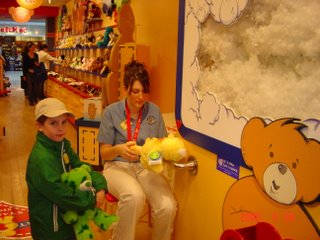 In honour of April being the Autism month at a Build-a-Bear, Jake and I invited Emily to spend an evening with us last week to thank her for everything that she does for the boys. For those of you who don't know about this store, it really is quite the money-maker and the kids (and grown-ups) love it. First, you choose from a selection of un-stuffed bears or characters, then you select an audio/sound box to put inside, then you stuff it, you insert a heart (after you've made a wish on it and gave it a kiss), it gets stitched up, fluffed up under a dryer then you're free to choose from the mass selection of clothing and accessories.
In honour of April being the Autism month at a Build-a-Bear, Jake and I invited Emily to spend an evening with us last week to thank her for everything that she does for the boys. For those of you who don't know about this store, it really is quite the money-maker and the kids (and grown-ups) love it. First, you choose from a selection of un-stuffed bears or characters, then you select an audio/sound box to put inside, then you stuff it, you insert a heart (after you've made a wish on it and gave it a kiss), it gets stitched up, fluffed up under a dryer then you're free to choose from the mass selection of clothing and accessories. 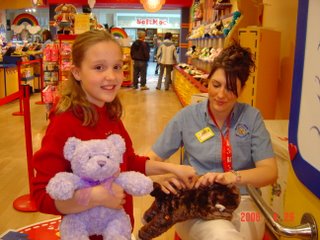
I made the feature bear with proceeds going to the Autism Speaks foundation, Jake made a chick and dressed her like Tinkerbell (the girls who worked there thought he was adorable for only wanting to look at the pretty clothes), Emily also made the purple feature bear and dressed it in bedtime clothes and together we all made a cookie monster named "Cookie-Willy" for Will and a monkey named "Monkey-Ow" for Owen.
The twins may not have cared about the stuffed animals when we brought them home, but we know they will appreciate them someday.
Monday, May 01, 2006
car rides, chicken coops & cheese curds
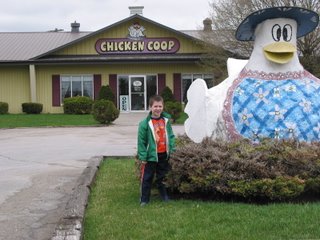 It's fun to post random messages and pictures every now and then, but when there's a lot to say, I put it off. Now here it is over a week later and my update on our trip to Ottawa is long overdue.
It's fun to post random messages and pictures every now and then, but when there's a lot to say, I put it off. Now here it is over a week later and my update on our trip to Ottawa is long overdue.Jake and I set out for our road trip last Saturday, with Gamma along for the ride. The weather was MISERABLE. It heaved buckets of rain from the moment we left the GTA until the moment we returned Monday evening. This didn't help Gram's aching knees, especially following the replacement surgery a month and a half ago.
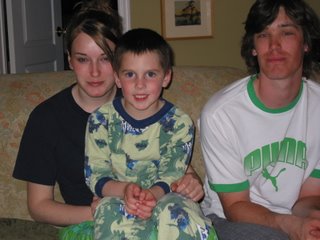
The plan was to stay at Uncle Tom's, visit with Uncle Jack & Aunt Sharon on Sunday, head out to the rally on the Hill on Monday morning and drive back home afterwards. We had fun hanging out with Nathalie and Dylan, otherwise known as 'Do' and as Jake so aptly declared "I get it! It's because of your hair-DO!". Jake got to see Goonies for the first time (proud moment for Mom and Auntie Boom) and got to stay up too late. Sunday we brought Nat with us for a visit to Uncle Jack's and we got to meet the new man of
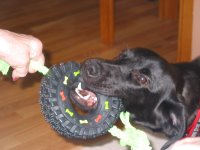 the house, Hunter. He's 8 wks old. They were going to name him Baron, but it sounded too much like Sharon. U. Jack got into Jake's bad books right off the mark by telling him that his school picture was ugly. Jake wasn't feeling too comfortable, was a bit afraid of the dog and was acting shy. Jack's teasing didn't sit too well. It only got worse when Jake's treasured helium balloon that he brought along, drifted to U. Jack at which point he teased Jake by saying he was going to break it. Jake got upset (naturally) and U. Jack continued with the teasing (of course) by dangling the string of the balloon in front of puppy-Hunter, saying "he's going to break your balloon".
the house, Hunter. He's 8 wks old. They were going to name him Baron, but it sounded too much like Sharon. U. Jack got into Jake's bad books right off the mark by telling him that his school picture was ugly. Jake wasn't feeling too comfortable, was a bit afraid of the dog and was acting shy. Jack's teasing didn't sit too well. It only got worse when Jake's treasured helium balloon that he brought along, drifted to U. Jack at which point he teased Jake by saying he was going to break it. Jake got upset (naturally) and U. Jack continued with the teasing (of course) by dangling the string of the balloon in front of puppy-Hunter, saying "he's going to break your balloon". 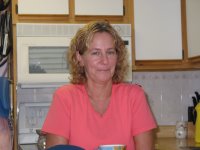 Before he could finish his sentence, Hunter bit and popped the balloon. Jake's face crumpled into tears and U. Jack looked more sheepish than I've ever seen him and he knew he was going to hear it from A. Sharon. It was one of those classic moments where you knew it was going bad and you want to cover your eyes to avoid seeing the crash that's about to happen. It really was humourous (not according to Jake). This led to Jake quite plainly telling U. Jack that his teeth were really yellow (so embarrassing). It really was a fun visit, despite how it sounds.
Before he could finish his sentence, Hunter bit and popped the balloon. Jake's face crumpled into tears and U. Jack looked more sheepish than I've ever seen him and he knew he was going to hear it from A. Sharon. It was one of those classic moments where you knew it was going bad and you want to cover your eyes to avoid seeing the crash that's about to happen. It really was humourous (not according to Jake). This led to Jake quite plainly telling U. Jack that his teeth were really yellow (so embarrassing). It really was a fun visit, despite how it sounds. Monday morning we woke up and one glance out the window sealed the deal. There was no way we were going to venture back into the city, to stand in the pouring rain at a rally, especially with Gram's bad knee. U. Tom called us to warn that the farmers were protesting at the same time and many of the streets were blocked off. Oh well. It sounds like the rally was a success without us (see previous posts). Our trip wasn't a complete failure. Gram and I thoroughly enjoyed our trips to the Maple Dale Cheese Factory; we stopped there on the trip to and from Ottawa -- gotta love fresh cheese curds mmmm. We also stopped at a place called the Chicken Coop. It was a cute little place that sold eggs and lots of crafty little gifts. We stocked up on our egg accessories. Gram couldn't help herself and got to talking with the woman who worked there. In the way that only a proud great grandmother can do it, by the end of the conversation she had managed to show off pictures and tell the woman all about her great grandsons who have autism. The woman tells Gram that her daughter works with a severely autism young woman and it turns out that it is the daughter of someone I met at a workshop several months ago. It was pretty ironic considering we were in a small town in the middle of Ontario and we managed, yet again, to make a friendly connection with someone because of autism.
All in all, it was a fun trip. We came home to HUGE smiles from The Brothers. They fared really well with Grandma and Daddy. On Sunday, Daddy took the boys over to Grandad and Grandma Enid's place for dinner. gag alert ahead. warning... As Dad says "they were golden all day, we got home, I put them to bed. Checked on them a half hour later to find Will buck naked and covered in sh**." Giggling and babbling, he had smeared it all about his crib, all over himself and had no qualms about eating it either. Straight to the tub and an hour of cleaning. I'm glad I wasn't home. In all seriousness though, this is one of the most frustrating things about dealing with the boys. They are three years old now. We dealt with this same scenario, ongoingly, about 8 months ago and previous. It phased out. Now it's back. Is this typical behaviour for a normally developing child if you consider that the boys are probably behind developmentally? Is it a behaviour? Is he seeking sensory stimulation? Are we over-analyzing? Is it wrong to want to beat our heads into the wall every time it happens????? AAARGH!!!! It's funny to talk about after the fact, but it truly is one of the most testing things that we seem to go through far too often in this life with our boys. I'm sure one day we'll look back on it and laugh...







